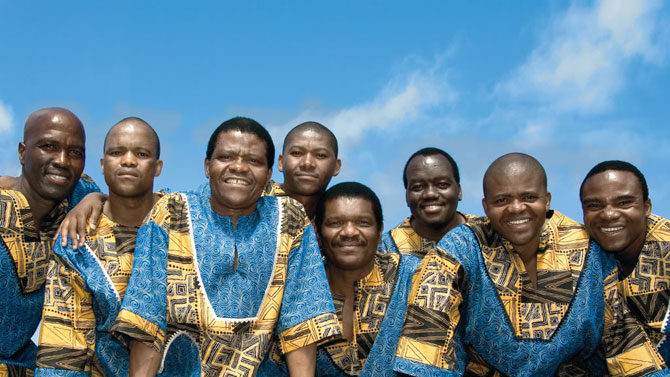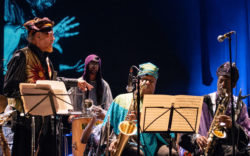In a way, the removal of technological barriers—wires, tubes, other primitive signal paths—works to create a greater closeness among people. Stripping away even the ancient tools of instrumentation, creating a situation where emotional information travels via soundwaves transmitted directly from voice to ear—that’s real intimacy. That’s the kind of gift that Ladysmith Black Mambazo offers its audience. With its approach, the venerable South African vocal group offers a combination of warmth and gravitas that cannot be found elsewhere.
This complex and original sound was born of a dream. The dreamer was founding (and current) member Joseph Shabalala, a factory worker hailing from a town four hours east of Johannesburg called Ladysmith. In the early 1960s, Shabalala dreamt of a singing group that combined the traditional sounds of isicathamiya—a Zulu vocal music often sung by those working the local mines—and Christian choral music. He set about implementing his vision, and Ladysmith Black Mambazo was the result; the group’s success was almost immediate and subsequently exponential.
First, LBM established itself as a formidable presence in local isicathamiya competitions. After sweeping the contests several years running (the Zulu word “mambazo” translates to “chopping axe”), the group was banned from competing to allow others to have a chance at winning.
“In Durban, where we live, or Johannesburg, the competitions will go on once or twice a month,” says Albert Mazibuko, who, like Shabalala, has been singing with LBM from the beginning. “When these competitions were done in the 1960s and 1970s, it was the biggest event of the week. It was a way for people to gather and enjoy themselves. People couldn’t go out during the week, so Saturday at the competitions was the night everyone looked forward to.
“It was so much fun,” Mazibuko continues. “I can’t truly explain it… People say, ‘You had to be there.’ The halls were filled with singing groups dressed in beautiful outfits. The audience was filled with friends and families supporting the various groups. You just cannot imagine the shouting, the applauding and the singing. Such incredible nights.”
An opportunity to record for a regional radio station in South Africa began a professional career that would grow to include over 30 albums. The group’s first release, 1973’s Amabutho, would the first album by black musicians to achieve Gold status in South Africa, but LBM’s fame exploded to a global scale 13 years later, when Paul Simon enlisted the group to perform on his landmark album Graceland. While this collaboration would become what LBM is best known for stateside, it remains just one career highlight among many for a collective that existed in harmony for decades prior and since, due in no small part to a close-knit dynamic and a not inconsiderable work ethic.
“By the time Paul Simon asked us to sing with him, we had a very stable membership,” says Mazibuko. “Some of those members retired in the early 1990s, and Joseph brought in four of his sons. We try to keep to family, because we have found that with all of the traveling we do, family members support and help each other. This is important for us. Of course, you must also have a wonderful singing voice. Most importantly is to have a dedication to the group. Rehearsing and traveling must come first.”
Nelson Mandela, the man who called Ladysmith Black Mambazo “South Africa’s cultural ambassadors to the world,” passed away at the end of 2013. “President Mandela was a special friend to Ladysmith Black Mambazo,” says Mazibuko. “When he was awarded the Nobel Peace Prize, he asked us to join him on his trip to Norway to receive the award. We sang at the ceremonies to represent the people of South Africa. He asked us many times to join him on trips overseas. Once, we sang for the Queen of England and her family at the Royal Albert Hall in London. It is an honor we hold dear to our hearts.”
Mazibuko describes the feeling of South Africans regarding the loss of their former leader as “one of pride and celebration. Pride in having had this great person as part of our struggle and becoming our President, as well as the symbol of hope that he became. Celebration of his life—not mourning of his death.”
WHO: Ladysmith Black Mambazo
WHERE: Georgia Theatre
WHEN: Saturday, Jan. 25, 7:30 p.m.
HOW MUCH: $27.50
Like what you just read? Support Flagpole by making a donation today. Every dollar you give helps fund our ongoing mission to provide Athens with quality, independent journalism.










